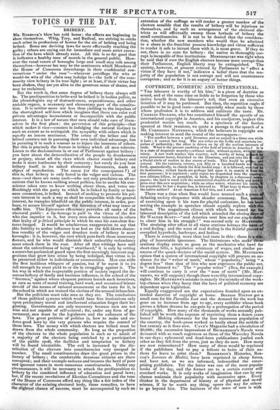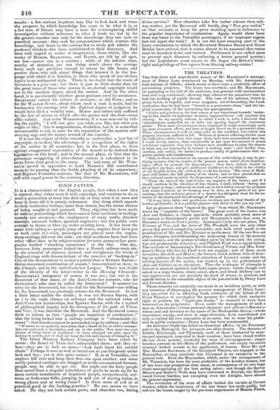COPYRIGHT, DOMESTIC AND INTERNATIONAL.
" THE labourer is worthy of his hire," is a piece of doctrine so sound, and at the same time so liable to be forgotten by those who derive benefit from the labourer's toil, that even an excessive iteration of it may be pardoned. But then, the repetition ought if possible to be in good taste—more especially when made by those whose profession it is to address and cultivate the taste. Mr.
CHARLES DICKENS, who has constituted himself the apostle of an international copyright in America, and his coadjutors, neglect this prudential maxim too much. As a specimen of the fustian spouted at their reunions, we quote a passage in the speech of a Mr. CORNELIUS MATTHEWS, which the believers in copyright are making interest to send the round of the newspapers- " The conflict between a paid literature and an unpaid is a fierce one while it lasts ; it cannot last long. The one relies on the feeble and uncertain im-
pulses of authorship; the other is driven on by all the restless interests of
trade. What is the present condition of the field of letters in America? It is in a state of desperate anarchy—without order, without system, witl t rw-
tainty. A new work reaches this country, well worthy of being pr ed by
some prominent house, furnished to the librarians' and put into the of
a liberal circle of readers in due course of trade. This would be pr and natural. On the contrary, twenty, yea fifty or a hundred hands ar thrust forth, spasmodically, to clutch the first lauded copy: it is followed, wa •I•ed to its destination; violent bands are perhaps laid upon it to snatch it mm its
first possessor; it is reprinted; early copies are despatched into the oountry; new editions follow, in pamphlet, in book, by chapters in a thousand news- papers; the land is vocal with the unrestricted chuckle of the daily and weekly press over this new acquisition ; while no other writer, whatever his tnerit, his popularity be but a degree less, is listened to. What hope is therelhere for the native author? As an American I feel this, and I avow it."
There was a time when Boz would have treated such a piece of debating society eloquence with slender ceremony. But, instead of exercising upon it his turn for playful caricature, he has been setting the example in speeches almost equally replete with the bathos. The magnificent climax with which he wound up his laboured description of the toil which attended the closing days of Sir WALTER Scorr—" and America sent him not one single dollar to cheer him in his struggle!" was second only to Maarrnews.
The straining after effect in all these orations betrays the loam of a real feeling; and the want of real feeling is the fruitful parent- of overpiled hyperbole, burlesque, and bathos. There is something more than bad taste in this : there i a dis- play of lamentable ignorance. The littemteurs who make rhatte.r..
orations display errors as gross as the mechanics who bawl for short-time bills, a legislative minimum of wages, and similar pa-
naceas of the quack-doctors of the social system. Mr. MATTHEWS opines that a system of international copyright will procure an au- dience for the "writer of merit," whose " popularity," being " a degree less" than that of him who now engrosses the public ear, is " not listened to." The " popular writer' (Boz, for example) will continue to carry it over the "man of merit" (Mr. MAT THEWS, we will suppose) though there were fifty international copy- rights. Mr.Marritswes mistake is exactly the mistake of the work- ing-classes when they fancy that the laws of political economy are dependent upon legislation. Equally exaggerated are the expectations founded upon an ex- tended duration of copyright at borne. Because MILTON got a
small sum for his Paradise Lost and the demand for the work has gone on to increase from age to age, every scribbler whose book proves a failure dreams he can gain by a prolongation of the period of copyright. How many of the thousands of works annually pub- lished will be worth the expense of reprinting them a dozen years hence ? Making allowance for the less numerous population of' the country, the book-press worked as busily about the middle of' last century as it does now. Cave's Magazine had a circulation of 30,000; the successive impressions of Rictraenson's Novels were devoured with as much eagerness as those of the Waverley Novels in our days ; ephemeral and dead-born publications jostled each other as they fell from the press, just as they do now. How many are now remembered ? How many of these would be reprinted if the publishers had to pay a tribute to heirs of their au-
thors for leave to print them? ROBERTSON'S Histories, Ros- cos's Lorenzo de Medici, have been reprinted in cheap forms,
and have not, as we are informed, indemnified the enter- prising publishers. Yet the latter was one of the most popular books of its day, and the former are to a certain extent still
standard works. It is only works of imagination that can by any
chance maintain their popularity with successive ages. Every thinker in the department of history or of physical and moral
science, if he be worth any thing, opens the way for others to go beyond him. The business of the mass of men is with results : a few curious inquirers may like to look back and trace the progress by which knowledge has come to be what it is, or, a few men of leisure may 'have a taste for contemplating skilful investigation without reference to what it leads to; but by far
the greater number care only for the knowledge they can turn to practical account : they seek for compendiums which contain this knowledge, and leave to the curious few to study and admire the profound thinkers who have contributed to their discovery. And even with regard to works of imagination, those which, like the works of HOMER, &MESTERE, and DANTE, are felt by all ages, are few—scarce one in a century ; while of the inferior class, -worthy of attention yet not rising much above the average level, each age produces enough to amuse its idle hours, and prefers those who talk about things that interest it in the lan- guage with which it is familiar, to those who speak of out-of-date topics in an antiquated style. There is no doubt that the trade of literature is a poor one ; but there is just as liule doubt that, for the great mass of those who pursue it, an eternal copyright would not in the smallest degree mend the matter. And on the other band, it is questionable whether great geniuses need its assistance. SHARSPERE turned his talents to account ; so did POPE; and as for Sir WALTER SCOTT, about whom such a rout is made, had he husbanded his earnings with the slightest degree of judgment he would have died a wealthy man. BURNS and others only suffered by the law of nature to which all—the genius and the fool—must - alike submit. And as for Woanswoars, if a man sets out by tell- ing the public, "I will not give you what you like, but what you ought to like," this is magnanimous, doubtless, but it is somewhat unreasonable to ask at once for the reputation of the austere self- denying sage and the money reward of the courtier. It is not the object of these remarks to undervalue a just law of copyright, or to deny the advantage of a recognition of the rights of the author in all countries ; but, in the first place, to warn exaggerated expectation of the benefit to be derived from
legislition on this head ; and in the second place, to hint that the -groteshue swaggering of after-dinner orators is calculated to do more harm than good to the cause. The bad taste of Mr. Wait- MEX.5 speech in opposition to Lord Matuom's Bill contributed • more..to its passing than the feeble pleading of all its supporters ; . and-Higdum Funnidos orations, like that of Mr. MATTHEWS, will with equal power in the contrary direction.



























 Previous page
Previous page